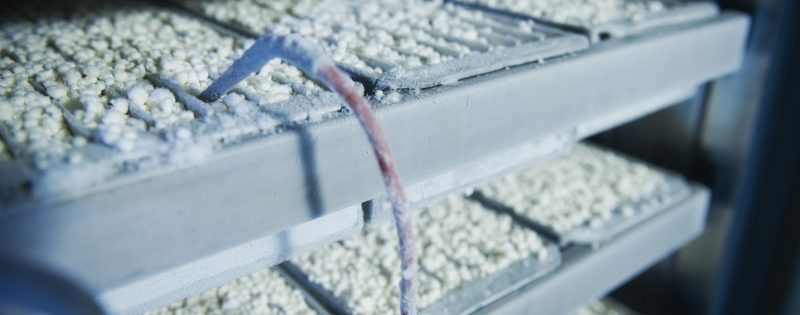Companies turn to freeze drying for stable nutraceuticals

Thought Leadership
April 2020
As health foods and supplements grow in popularity around Europe, European Freeze Dry Country Manager Diana Morris explores the opportunities that freeze drying systems provide to nutraceuticals producers.
Nutraceutical suppliers are turning to modern food processing methods such as freeze drying to produce the latest health supplements.
Using food products for their health benefits is not a new phenomenon. Common messages around eating fruit and vegetables to maintain our vitamin and nutritional intake have been around for years.
However, scientists are increasingly finding new methods to use different ingredients to offer health benefits, such as preventing flu, reducing obesity or increasing fertility, which can improve our quality of life.
The demand for nutraceuticals is growing. It is expected that the nutraceuticals market in Europe will be worth $108 billion by 2027. As we all focus more attention on our own health, natural supplements are rising in popularity – particularly amongst those following a superfood diet.
At European Freeze Dry, we continue to work with nutraceutical suppliers to gently freeze dry products so that they can be consumed, either in a different format such as a powder or at a more intensive dose.
What is a nutraceutical?
Nutraceuticals tend to be taken as supplements, designed to provide additional health benefits and tackle various ailments.
The food we eat contains a variety of enzymes which can be beneficial, or sometimes detrimental, to our health.
Most people grow up learning that milk is good for growing strong bones, and how oranges provide us with vitamin C to boost our immune systems. Oily fish is highlighted for improving brain function, while walnuts are frequently recommended for reducing heart disease. These examples of superfoods are the most well-known forms of nutraceuticals.
Scientists and nutritionists are now examining a variety of common and more exotic food types, and how their natural qualities can provide health benefits, from adding a nutritional supplement to a diet, through to targeting more specific benefits such as aiding weight loss or cancer prevention.
More recently, newly discovered flavonoids such as rosehip and elderberry juices are being included into flu prevention products. Similarly, lamb’s hearts are used routinely in a powdered format to supplement men’s health and wellbeing. Freeze-dried liver is also regularly used as an iron supplement, which can improve red blood flow and reduce the chance of anaemia.
In their original form, these products are not easily digestible, transportable, or even appealing. For many animal-based products, their raw state will only stay safe to consume for a very short period.
So how do food processors turn products such as liver into a product which can be bottled as tablets that can be stored at room temperature without affecting them?
Freeze drying is the best solution
Freeze drying technology is benefitting from a resurgence thanks to the benefits it offers to food processors. For nutraceutical producers, maintaining the viability of cells in the food product is as important as ensuring a long shelf-life.
To ensure a quality final product which continues to offer health benefits, while creating a supplement that won’t deteriorate over a long-period of time, requires an extremely gentle drying process. Freeze drying removes the water content from products over the course of up to 72 hours, leaving the final product structurally stable, maintaining all the nutritional and health benefits of the original product.
Compared to more aggressive drying methods such as spray drying or air drying, freeze drying methods are proven to retain the purity of the product, even when they are ground down into a powder.
At European Freeze Dry, all products for freeze drying start as frozen raw materials, and undergo a process known as sublimation under specifically designed programmes.
Freeze drying technology gently removes the water in a product whilst retaining the natural colour, shape and nutritional characteristics.
During the freeze drying process a deep vacuum is applied, and under these conditions neither ice or water can exist. The pressure from the vacuum, with a controlled amount of heat applied, causes the ice to leave the product as a vapour trail which is then captured on an ice condenser within the freeze drier, upon which the vapour forms again as ice.
The process takes on average between 24 to 72 hours to complete depending on the raw product, and is carried out in a set of ‘chambers’ which can be controlled at various temperatures and time schedules depending on specific product requirements.
Freeze drying also means there is a much reduced potential for microorganisms existing in such low amounts of water, ensuring that nutraceuticals can stay safe to consume over an extended time period, up to two years.
The result is a 100 per cent natural freeze dried product, which retains the flavour structure and nutritional benefits of the raw product. From there, it can be supplied as a stable supplement or ground down into a powder which can be inserted into tablets.
For nutraceutical producers, that means raw materials such as rosehip, elderberry or liver can be packaged in a tablet which can be supplied to chemists or sold online, meeting the consumer demands for new superfood supplements.

